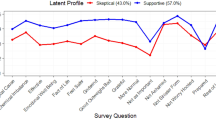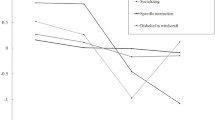Abstract
The study examined mental health providers' and families' of adults with severe mental illness beliefs regarding the etiology of mental illness. A countywide sample of 87 providers and family members was collected over a course of six months as part of a consensus building process to institute family education. Beliefs regarding the biological basis of mental illness are not replacing family causation beliefs for providers and families. Instead, providers and families hold biological and family causation theories regarding the etiology of mental illness simultaneously. Providers with less family contact were more likely to believe that families may cause mental illness, when controlling for race, gender, education, and years working in mental health. Families with negative provider experience are also more likely to hold family causation beliefs, when controlling for race, gender, and education. Further research is needed to explore the effects of provider and family beliefs regarding the etiology of mental illness on provider–family contact and collaboration.
Similar content being viewed by others
REFERENCES
Cook JS, Pickett SA, Cohler BJ: Families of adults with severe mental illness—The next generation of research. American Journal of Orthopsychiatry 67:172-176, 1997.
Anderson C, Reiss D, Hogarty G: Schizophrenia and the Family. New York, Guilford, 1986.
Falloon I, Boyd J, McGill C: Family Care of Schizophrenia. New York, Guilford, 1985.
Leff J, Kuipers L, Berkowitz R: Controlled trial of social interventions in the families of schizophrenic patients. British Journal of Psychiatry 141:121-134, 1982.
Pitschel-Walz G, Leucht S, Bauml J, et al: The effect of family interventions on relapse and rehospitalization in schizophrenia: A meta-analysis. Schizophrenia Bulletin 27:73-92, 2001.
Dixon L, McFarlane W, Lefley H, et al: Evidence-based practices for services to families of people with psychiatric disabilities. Psychiatric Services 52:903-910, 2001.
Dixon L, Lehman A: Family interventions for schizophrenia. Schizophrenia Bulletin 21:631-643, 1995.
Frances A, Docherty J, Kahn D: The expert consensus guidelines series: Treatment of schizophrenia. The Journal of Clinical Psychiatry 57:1-58, 1996.
APA: Practice guidelines for the treatment of patients with schizophrenia. The American Journal of Psychiatry 154(Suppl.):1-63, 1997.
McFarlane W: Fact: Integrating family psychoeducation and assertive community treatment. Administration and Policy in Mental Health 25:191-198, 1997.
Robinson E: Causal attributions about mental illness: Relationship to family functioning. American Journal of Orthopsychiatry 66:282-295, 1996.
Lam D: Psychosocial family intervention in schizophrenia: A review of empirical studies. Psychological Medicine 21:423-441, 1991.
Spaniol L, Zipple A, Lockwood D: The role of the family in psychiatric rehabilitation. Schizophrenia Bulletin 18:341-347, 1992.
Lefley H: Family burden and family stigma in major mental illness. American Psychologist 44:556-560, 1989.
Hatfield A: Coping effectiveness in families of the mentally ill: An exploratory study. Journal of Psychiatric Treatment and Evaluation 3:11-19, 1981.
Hatfield A, Lefley H: Families of the Mentally Ill: Coping and Adaptation. New York, Guilford, 1987.
Brown A: New perspectives on the neurodevelopmental hypothesis of schizophrenia. Psychiatric Annals 29:128-130, 1999.
Bearden C, Cannon T: Neurodevelopmental origins of schizophrenia, in The Science of Clinicial Psychology: Accomplishments and Future Directions. Edited by Routh D, DeRubeis R. Washington, DC, American Psychological Association, 1998.
Terkelsen K: A historical perspective on family-provider relationships, in Families as Allies in the Treatment of the Mentally Ill. Edited by Lefley H, Johnson D. Washington, DC, American Psychiatric Press, 1990.
Solomon P, Draine J, Mannion E, et al: The impact of individualized consultation and group workshop family education interventions on ill relative outcomes. The Journal of Nervous and Mental Disease 184:252-254, 1996.
Rosenfarb I, Miklowitz D, Goldstein M, et al: Family transactions and relapse in bipolar disorder. Family Process 40:5-14, 2001.
Author information
Authors and Affiliations
Corresponding author
Rights and permissions
About this article
Cite this article
Marshall, T., Solomon, P., Steber, SA. et al. Provider and Family Beliefs Regarding the Causes of Severe Mental Illness. Psychiatr Q 74, 223–236 (2003). https://doi.org/10.1023/A:1024110403611
Issue Date:
DOI: https://doi.org/10.1023/A:1024110403611




